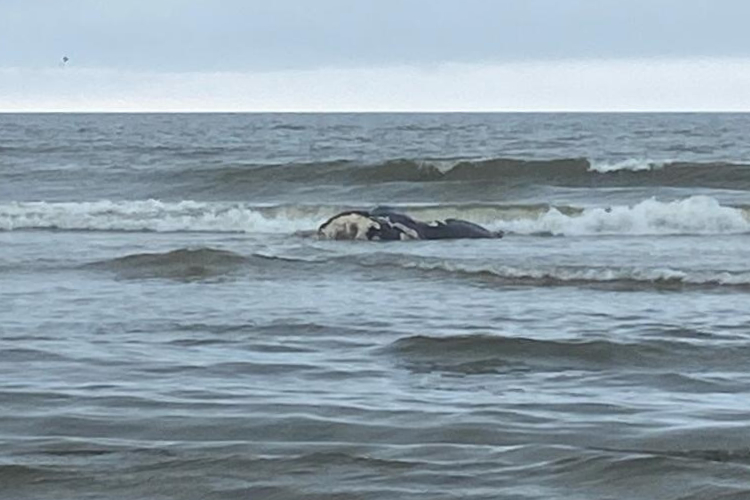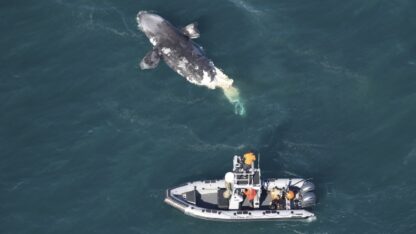Injured right whale calf found dead off Georgia coast

Wildlife officials on Sunday discovered a dead North Atlantic right whale calf on the beach at Cumberland Island National Seashore, the National Oceanic and Atmospheric Administration Fisheries Service reported.
It’s the second juvenile right whale to be found dead in Georgia in the last three weeks. A yearling female was reported dead offshore and towed to a Tybee beach for examination in February. Both animals were killed by being struck by a boat or ship.
U.S. Rep. Buddy Carter, who represents the Georgia coast, has worked to stymie additional protections for the whales proposed by federal regulators. He claims that the chance of any single boat hitting a whale is about one in a million, which fails to shed light on the risk to the approximately 360 right whales that remain.
Whale researchers from multiple state and federal agencies identified the animal on Cumberland as the injured calf of right whale #1612, nicknamed “Juno.” The calf was born in late November and was the first right whale calf documented this calving season. Juno’s calf was seen again off South Carolina on Jan. 3, with serious injuries to its head, mouth, and lip from a vessel strike.
Despite the injury, the calf was seen again swimming with its mother off Sapelo Island on Feb. 1, offering hope that it would survive.
Those hopes disappeared Sunday with the appearance of the carcass, which was heavily scavenged by sharks. Unique injuries and markings documented when the calf was alive allowed researchers to identify it. NOAA Fisheries and its partners will necropsy the calf, using genetic testing to determine its sex.
Juno’s calf was previously added to the ongoing North Atlantic right whale Unusual Mortality Event as a serious injury, but will now be included as the 39th mortality case. The Unusual Mortality Event began in 2017 and includes 123 individuals (39 dead, 33 seriously injured, and 51 sublethally injured or ill). The primary causes of the UME are entanglements in fishing gear and vessel strikes in both U.S. and Canadian waters, which are long-standing threats to the recovery of the species.
Right whales were named for being the “right” whale for whalers to kill. They swim slowly and hug the shore, habits that put them in the path of many vessels. Right whales, which eat tiny crustaceans, feed in the waters off New England and Canada. Females migrate to the warmer waters off the Carolinas, Georgia and northeast Florida to give birth. Nineteen calves have been documented in the Southeast this calving season, but at along with Juno’s calf, two others are believed to be dead.
On Sunday, U.S. Rep. Buddy Carter (R-St. Simons) reiterated his stance against NOAA’s proposed expansion of right whale speed rules, using inflated estimates about the effects of the rules on the recreational boating industry as well as an incomplete picture of the threat to the safety of harbor pilots.
” … NOAA must pull back on its proposed speed restriction,” Carter wrote in his weekly newsletter, which also critiqued the Endangered Species Act.
The proposed rules would expand the existing speed limits to include smaller vessels of 35 feet or over. Currently only vessels 65 feet or longer are regulated for speed to protect right whales. The injuries to Juno’s calf indicate they came from the propeller of a vessel approximately 35-57 feet long.
The Current previously examined Carter’s claims in this fact check.
Carter’s spokeswoman Harley Adsit did not respond to an email requesting comment.
Environmental groups want action on the proposed regulations.
“We cannot save North Atlantic right whales from impending extinction if we do not take commonsense measures to protect them, especially calves and juveniles, from being run over and killed by boats,” said Jane Davenport, senior attorney at Defenders of Wildlife. “Juno’s calf inspired so much hope as the first right whale calf of the season, but it spent most of its short life suffering from terrible propeller wounds as a direct result of the Biden administration’s failure to put such commonsense measures in place.”
This story was provided by WABE content partner The Current.








